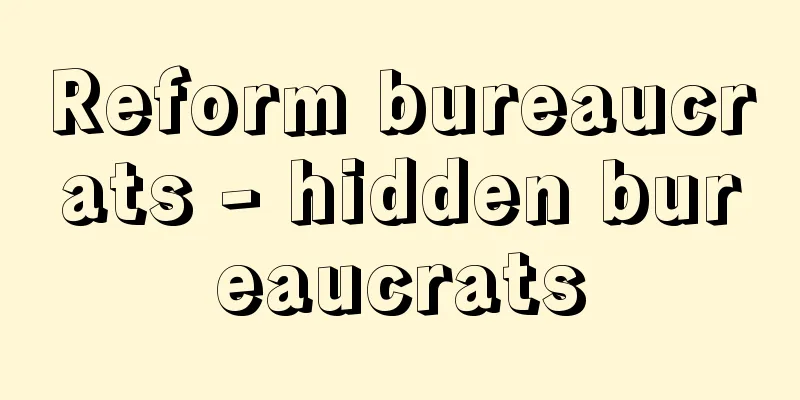Reform bureaucrats - hidden bureaucrats

|
The bureaucratic forces that sought to realize strong wartime economic control, based in the Planning Board established in October 1937 (Showa 12). They suddenly attracted attention when Kiwao Okumura, who had joined the Cabinet Research Bureau (the predecessor of the Planning Board) from the Ministry of Communications, and others drafted and promoted the Electricity National Control Bill. In March 1938, the 73rd Diet passed both the National Mobilization Bill and the Electricity National Control Bill, and conflicts over national control of the economy came to the surface between the business community, the military, and reformist bureaucrats (for example, the issue of Article 11 of the Total Mobilization Law and the imposition of profit controls in the autumn of the same year). This conflict came to a head in July 1940, immediately after the formation of the second Konoe Fumimaro cabinet, over the issue of a new economic system. Under the leadership of Naoki Hoshino, president of the Planning Board, Okumura, Yoji Minobe, Hisatsune Sakomizu, Hideoto Mori and others were drafting the outline for establishing a new economic system, which meant direct bureaucratic control over private enterprises, and they fiercely fought against the business world's proposal for self-control. They were bureaucrats who responded to the establishment of a total mobilization system as envisaged by the military under the wartime regime, but in the end they faced strong opposition from the business world and others and were unable to realize their plan. [Kenichi Yoshii] [References] | |Source: Shogakukan Encyclopedia Nipponica About Encyclopedia Nipponica Information | Legend |
|
1937年(昭和12)10月創設の企画院を拠点に、強力な戦時経済統制の実現を図った官僚勢力。逓信(ていしん)省から、企画院の前身である内閣調査局に入った奥村喜和男(きわお)らが電力国家管理法案を起案・推進したことから、にわかに注目を浴びた。38年3月の第73議会で、国家総動員法案と電力国家管理法案がともに通過、成立したため、経済の国家統制について、財界と軍部、革新官僚の対立が表面化した(たとえば同年秋の総動員法第11条、利潤統制の発動問題など)。この対立は、40年7月、第二次近衛文麿(このえふみまろ)内閣成立直後の経済新体制問題において頂点に達した。企画院総裁星野直樹(なおき)の下で、奥村のほか、美濃部洋次(みのべようじ)、迫水久常(さこみずひさつね)、毛里英於菟(もうりひでおと)らが、私企業に対する直接の官僚統制を意味する経済新体制確立要綱の立案にあたり、財界の自主統制案と激しく抗争した。彼らは、戦時体制下において、軍部の志向する総動員体制の確立に呼応した官僚勢力であったが、結局財界などの強い反対にあい、そのプランを実現することができなかった。 [芳井研一] [参照項目] | |出典 小学館 日本大百科全書(ニッポニカ)日本大百科全書(ニッポニカ)について 情報 | 凡例 |
<<: Innovation Club - Kakushin Club
>>: Revolutionary Movement Dispute
Recommend
Pyrophyllite (English spelling)
Also called pyrophyllite. Al 2 (Si 4 O 10 )(OH) 2 ...
Initiation (Cancer) - Ancient
…This fact suggests the length of the life cycle ...
From Fantasy to Science
...Other works include "The Origin of the Fa...
Dutch literature
It was during the 12th and 13th centuries that a ...
Titanium oxide - Sankachitan (English spelling) titanium oxide
A compound of titanium and oxygen. Three types of...
Trommsdorff, JB (English spelling) TrommsdorffJB
...Volume 1 covers general topics such as chemica...
Mingo Nisso - Mingo Nisso
(Also called "Mingojisso") A commentary ...
Yi-li-bu; I-li-pu
[Born] Qianlong 37 (1772) Died in 1843. Guangzhou....
Ennodius
…The last secular poet was probably Corippus in t...
Palos de la Frontera (English spelling)
A village with a population of 3,353 (1979) on the...
Baekje River - Kudara no Kawanari
Year of death: 853.9.30 (Jinju 3.8.24) Year of bir...
Ishi
An official who managed and operated irrigation wa...
Court official - Kyukan
…In addition to the empresses, the harem included...
cook
…The concept of cooking in each language has a di...
Enclosure - Enclosure
The term "enclosure" refers to the act ...









